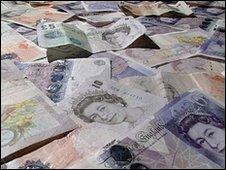Business start-up rate in Scotland 'worsening'
- Published

Scotland had one of the lowest rates of business start-ups of the 20 countries
Scotland's low rate of business start-ups has worsened with the recession, according to new research.
The Strathclyde University analysis showed the gap between business-forming activity in Scotland and comparable countries has widened significantly.
Of 20 similar countries, only Belgium and Japan had lower entrepreneurial activity during the last 11 surveys.
Scotland was also found to have a low perception of business opportunity, when set against other countries.
The research used an index to measure business formation activity. For Scotland, this declined by 18% between 2008 and 2009, leaving it at 3.6%. The UK rate for last year was 5.8%.
While the index is static for Britain as a whole, it is in decline in Scotland.
Carried out in the Hunter Centre for Entrepreneurship in Strathclyde Business School, the Global Entrepreneurship Monitor (GEM) found more than two-thirds of those with businesses at an early stage of formation said it was tougher-going during 2009 than the previous year.
The proportion of people intending to start up a business has been lower than the figure for the whole UK since 2004.
And the number who believe there are good opportunities for those who set up in business fell, with the recession, from 33% to 20% last year. That fall is in line with the rest of the UK, but comparable countries across Scandinavia have 40% of people seeing opportunity for entrepreneurs.
'Radical look'
The research also showed Scotland has a particularly low level of investment funding in friends' and families' businesses: a third of the UK rate and a tenth of the rate in Scandinavian countries.
There was a much stronger perception of opportunity for business start-ups among those with family firms, particularly those who have worked in their parents' companies.
Dr Jonathan Levie, director of the Hunter Centre of Entrepreneurship, said: "Scotland had a delayed reaction to the global economic slowdown, but the reaction in terms of entrepreneurial and investment activity seems to be more severe than that in the UK as a whole and other small, high income, independent nations.
"This weakness in the face of economic challenge is worrying, since new start-ups can help drive a recovery in employment and economic activity.
"Initiatives to encourage innovation by businesses, stimulate target industries and improve employability of individuals may pay some dividends, but deep problems remain. What is required is direct action to encourage new business creation.
"In a society where knowledge of business and entrepreneurs is low, as it is in Scotland where 77% of Scots do not have a family business background, intervention through education and training is necessary."
Sir Tom Hunter, the retail and property magnate who endowed the Hunter Centre for Entrepreneurship at Strathclyde, said: "My fear for Scotland, unless we in the public, private and third sectors work together to grow our economy, is of a major social and economic reversal of fortune.
"Scotland faces a triple economic tsunami - reduced government spending, declining entrepreneurial activity and markedly increased unemployment particularly in the Neet (not in employment, education or training) category.
"Scotland as a whole needs to take a radical look at itself and change markedly. Aggressive fiscal policies are required as is ground level support for entrepreneurial start-ups.
"The good news is this - we are a small nation and as such we can get everyone that counts in a room to change that nation for the good of all".